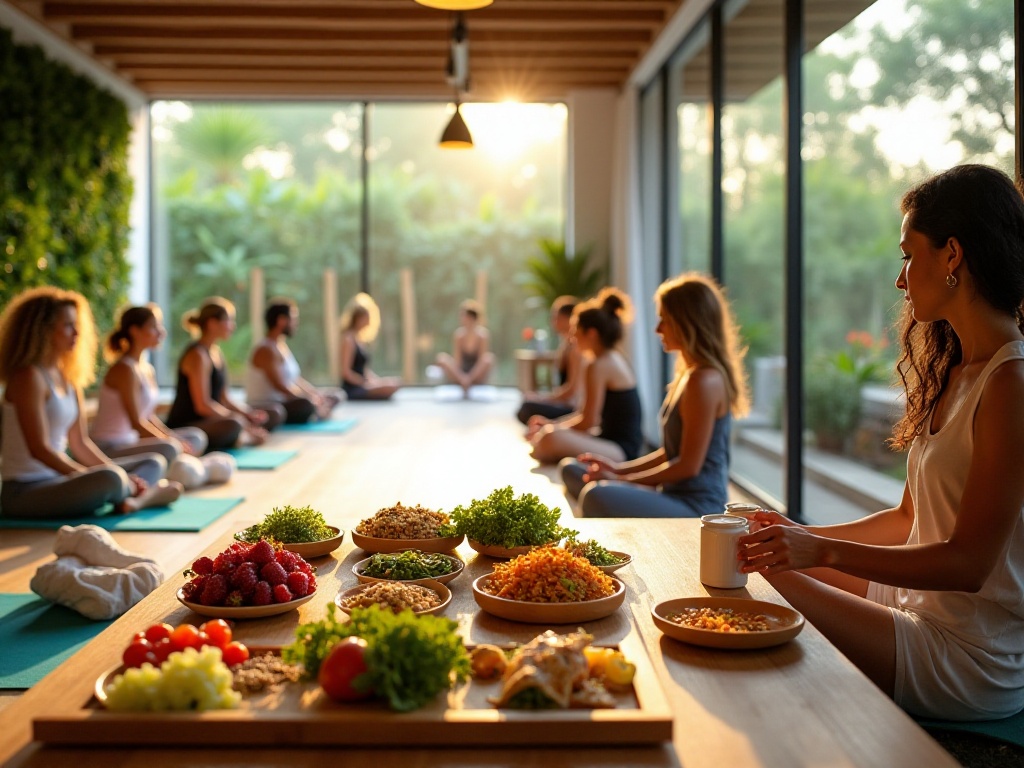Opening Words
Do you often find yourself puzzling over takeout options when alone at home? Do you think eating alone means settling for whatever's convenient? That's not necessarily true. As a food blogger who has lived alone for 6 years, I deeply understand that eating alone requires even more refinement, as it affects our physical and mental wellbeing. Today I'll share my insights on managing solo dining.
Philosophy of Refined Living
When I first started living alone, dinner was often just instant noodles. Until one day, seeing my haggard reflection in the mirror made me realize how much diet affects one's vitality. My hair had lost its shine, my complexion had dulled, and my energy levels had dropped. This made me rethink my lifestyle.
Since then, I began studying how to make solo dining more refined. I discovered that refinement isn't just about the food itself, but about attitude towards life. I started paying attention to ingredient selection, cooking methods, table settings, and even meal timing. Gradually, I noticed my quality of life improving without even realizing it.
Living alone doesn't mean being careless about life. On the contrary, being solo means we should treat ourselves even better. Every morning, I make myself coffee and a homemade sandwich, enjoying breakfast by my sunny window. This sense of ritual fills my whole day with energy.
Nutritional Balance Method
Many people find nutritional balance troublesome. But there's actually a simple principle: include five colors in your daily diet. Specifically, eat at least 400g of fruits and vegetables daily, roughly equivalent to two apples plus a plate of broccoli.
Dark green leafy vegetables are rich in folic acid and dietary fiber, orange carrots are full of beta-carotene, and red tomatoes provide abundant lycopene. Different colored vegetables and fruits provide different nutrients. I usually ensure at least three different colors in each meal, making it not only nutritionally balanced but also appetizing.
For better nutritional balance, we should also mind our staple foods. For example, replacing white rice with brown rice, or regular noodles with whole wheat ones. This not only adds fiber but also increases satiety. I often cook a pot of brown rice on weekends, divide it into small portions to freeze, and heat up one portion when needed - very convenient.
Protein intake is also important. Fish, shrimp, eggs, and lean meat are great protein sources. I ensure one portion of protein at each meal, like a boiled egg for breakfast, stir-fried shrimp for lunch, and a fish fillet for dinner. This ensures nutrition while avoiding monotony.
Nuts are also great companions for solo dwellers. A small handful of nuts daily supplements essential fatty acids and makes a healthy snack. I keep a small jar of mixed walnuts, almonds, and cashews on my desk - healthy and convenient when hunger strikes.

Solo Shopping Strategy
Did you know that grocery shopping is one of the biggest headaches for solo dwellers? Buy too much and it spoils, too little and it's not enough. Through years of experience, I've developed a set of solo shopping rules.
Every Sunday night, I make a shopping list for the week. This isn't random - it's based on my work schedule and meal plans. For instance, if I know I'll work late Wednesday, I'll prepare ingredients for quick meals; if I'm planning to cook properly on the weekend, I'll buy ingredients that need more preparation time.
Buy enough fresh leafy vegetables for three days, and root vegetables for a week. I buy lettuce and spinach every other day as they spoil easily. Carrots and potatoes can be bought in weekly quantities.
Meat can be divided and frozen for use as needed. I usually divide large packages of meat into single-portion sizes, wrap them in preservation bags, date them, and freeze them. This maintains freshness and prevents waste. It's also convenient for defrosting - no worrying about thawing too much.
Fruit selection requires strategy too. For easily ripening fruits like bananas and kiwis, I buy both ripe and unripe ones to ensure I have suitable fruit each day. Apples and oranges that keep longer can be bought in larger quantities.
I've developed a habit of bringing reusable shopping bags and containers. This is not only environmentally friendly but keeps ingredients intact during transport. Delicate fruits especially benefit from container protection against bruising.
Cooking Skills Progression
The most essential skill for solo dwellers is definitely cooking. I've progressed from burning simple stir-fried vegetables to being able to prepare decent meals. This journey, though full of laughter and tears, has been incredibly rewarding.
I remember my first attempt at sweet and sour ribs - I messed up the seasonings several times. Later I discovered cooking follows patterns. For instance, quick high-heat stir-fries require all ingredients to be prepared in advance, while slow-cooking dishes need careful heat control.
Basic cooking techniques are crucial. Even something as simple as cutting vegetables takes practice to achieve uniformity. When I started learning to cook, I bought a cutting board specifically for practice. Gradually, I progressed from basic dicing and julienning to beautiful diagonal and diamond cuts.
Seasoning is also an art. I keep a small notebook in the kitchen to record seasoning quantities. Through constant adjustment and recording, I've found the proportions that suit my taste. For example, when stir-frying vegetables, I like to start with some minced garlic for fragrance, then add appropriate salt and a pinch of white pepper powder, maintaining the vegetables' natural sweetness without being bland.
Kitchen tools matter too. A good knife and a suitable wok can make cooking much more enjoyable. I especially recommend getting a rice cooker - it's not just for rice, but also for porridge, soup, and even cakes - a solo dweller's essential.
To make cooking more interesting, I often try different cuisines. Sometimes it's simple Chinese stir-fries, sometimes Western pasta, occasionally Japanese cuisine. This not only improves my cooking skills but makes solo living more colorful.

Tableware Selection Experience
Many think any bowl or plate will do when eating alone. But I believe fine tableware can greatly enhance solo living. Carefully selected tableware not only improves dining experience but also lifts mood.
My tableware is configured for different scenarios. White porcelain for breakfast creates a cheerful mood; dark ceramic bowls and plates for dinner create a cozy atmosphere. Different tableware creates different dining atmospheres, which really helps with mood regulation.
Practicality in tableware selection is important too. I choose dishes that can go straight from oven to table, which helps with both temperature maintenance and reduces washing. Compartmented plates are particularly suitable for portion control when eating alone.
Material choice matters. Ceramic tableware retains heat well and doesn't retain odors; glass tableware's transparency is great for plating; stainless steel is durable and economical. I choose different materials for different scenarios.
Tableware storage and maintenance is also important. I keep frequently used items easily accessible, with less used items in storage cabinets. Everything gets washed immediately after use and dried before storage to extend lifespan.
Ingredient Preservation Tips
Food spoilage is a major concern when living alone. Over the years, I've developed some practical preservation tips. These methods keep ingredients fresh and reduce waste, particularly useful for solo dwellers.
Leafy vegetables like lettuce and chives can be wrapped in preservation bags and stored in the refrigerator's vegetable compartment. Wipe off excess moisture before storage to prevent rot. For more delicate leaves, wrap in kitchen paper before bagging to better absorb excess moisture.
Fruits like apples and pears should be stored separately as they affect each other's ripening. Some fruits release ethylene gas, accelerating ripening in others. Pay attention to storing different types of fruit separately to prevent mutual influence.
Leftovers are a common issue for solo dwellers. Best consumed within 24 hours, don't store too long. If you can't finish, divide into small portions in containers and refrigerate, so you can heat just one portion when needed.
Meat preservation is particularly important. Fresh meat should be promptly divided and frozen in moderate portions for convenient defrosting. Remove as much air as possible before freezing to prevent freezer burn.
Seasoning storage needs attention too. Soy sauce and vinegar should avoid direct sunlight, best kept in cool, dry places. Moisture-sensitive seasonings like salt and sugar should be in sealed containers, away from the stove to prevent clumping.

Conclusion and Outlook
Through years of exploration, I've deeply realized that solo dining deserves attention. It's not just about health, but an attitude towards life. While solo living offers freedom, it requires more thought and care.
In this process, I've learned to better care for myself and found joy in living. Daily carefully prepared meals nourish both body and soul. Seeing my cooking improve and enjoying self-prepared meals brings satisfaction no takeout can match.
I hope sharing this article helps more solo dwellers find their own dining management style. Life keeps moving forward, and we must keep learning and growing. Let's work together to make solo living refined and happy.
How do you handle solo dining? Feel free to share your story in the comments. Your experience might help others. Let's exchange ideas, improve together, and make solo living more beautiful.


